Four media houses, which were arbitrarily closed by the Ugandan government, were reopened on 30 May. This comes after 10 days of heavy police deployment at their respective premises, where journalists were attacked and arrested.
Four media houses, which were arbitrarily closed by the Ugandan government, were reopened on 30 May. Their reopening comes after 10 days of heavy police deployment at their respective premises. During that time, police engaged in running battles with journalists and civil society organizations, who were protesting the closures.
The Daily Monitor newspaper – together with its sister radio stations KFM and Dembe FM at Namuwongo in Kampala – as well as Red Pepper, located at Namanve, were closed down by the government on 20 May. The media outlets were closed over the search of a controversial letter written by the coordinator of security services, General David Sejuja and published by the Daily Monitor. General Sejuja is currently out of the country,
The outgoing internal affairs minister, Engineer Hillary Onek, announced at the government’s media center that – after a series of meetings between the management of the respective media houses and the Ugandan president and police chief – an agreement was reached to reopen the media houses on certain conditions. Heavily armed police vacated the premises and handed over the media houses to their respective managements.
On 27 May, Human Rights Network for Journalists-Uganda gave the government a three-day ultimatum to reopen the four media houses unconditionally or be dragged to court. HRNJ-Uganda also mobilized journalists to show solidarity to the victim media houses through a campaign dubbed “Walk to camp at Namuwongo for a free media”. The police violently tear gassed and used batons to disperse the journalists, who had camped outside the closed Monitor offices. Three journalists were subsequently arrested, and two of them were charged with inciting violence.
Meanwhile, a court in Kampala has adjourned the hearing of an application by four Monitor Publications Limited journalists to 12 June. The application seeks to cancel an order by police to produce an original copy of the controversial letter by General Sejusa.
“This victory is for the journalists and civil society organizations that stood firm against the barefaced abuse and violation of media rights and freedoms by the government. It’s however too early to celebrate, because the perpetrators of these acts are still scot-free; this is impunity. Such acts of intimidation are aimed at muzzling the critical media; they should therefore be resisted by the various stakeholders”, said the national coordinator of HRNJ-Uganda, Geoffrey Wokulira Ssebaggala.


